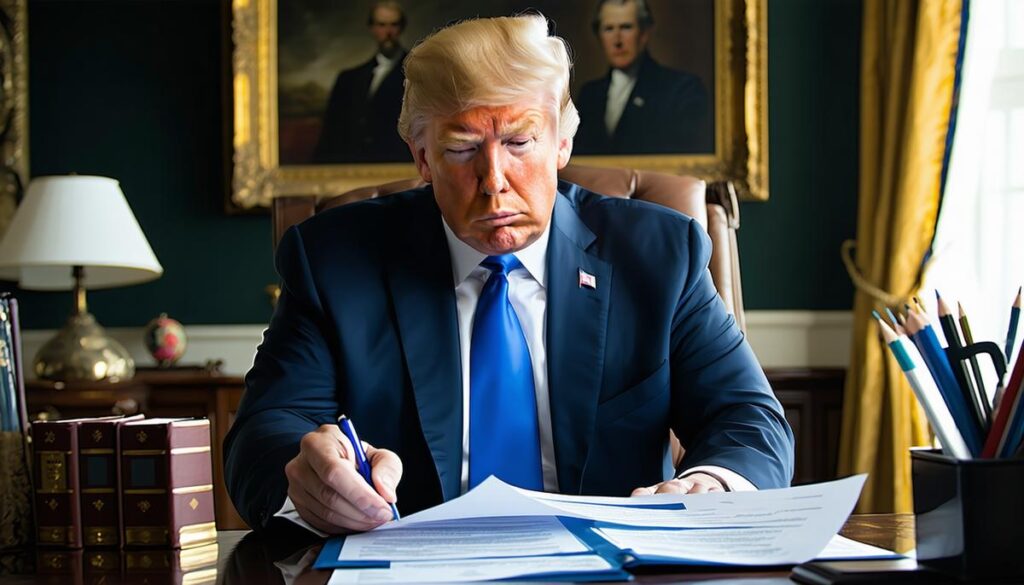Trump’s Promise to Pardon Jan. 6 Rioters
President-elect Donald Trump is poised to make waves with his declaration to pardon most participants of the Jan. 6 Capitol riot. Trump has promised to start issuing pardons in the “first nine minutes” of his presidency, focusing largely on non-violent offenders.
In interviews, Trump’s criteria seem clear as muddy waters. He suggests clemency reviews on a “case-by-case” basis, sidestepping a blanket pardon. “I’m inclined to pardon many of them,” Trump remarked during a CNN Town Hall. Yet, he’s not committing to a one-size-fits-all approach.
The legal system is buzzing with activity. Lawyers for those involved in the riot are attempting to delay trials and sentencing hearings, banking on Trump’s anticipated pardons. Some judges are having none of it, perhaps thinking, “Not today, maybe tomorrow!”
Trump hasn’t detailed the pardon process. Will there be applications or will he just wing it? One lawyer quipped they’ve been telling clients, “Stay tuned, as it’s still being figured out,” effectively signing up for a game of legal limbo.
The Justice Department insists: a pardon is not an eraser. “You can’t unring the bell of the conviction,” a federal prosecutor emphasized. It’s like saying, “You can’t unfry the egg,” but with more gavel and less yolk.
As Inauguration Day approaches, perceptions and expectations are shifting quickly. Trump’s as-of-yet unwritten process cannot come soon enough for those hopeful for a reset. Or as one court declared rather bluntly: “Blanket pardons would be frustrating but aren’t my call.”

Legal and Political Implications of Trump’s Pardon Promise
This potential wave of pardons is no plain sailing. The legal and political implications are significant, with constitutional ripples that could turn into waves. Presidential pardon power is a mighty tool, and legal scholars like Kim Wehle warn that Trump might be pushing the boundaries of what the Constitution typically allows.
Wehle points out that there are essentially no express limits on a president’s power to pardon federal offenses, a freedom that could wade into murky waters if used to pardon individuals involved in political acts. How might this influence the morale of those standing guard?
Political analysts are bracing for impact. Some foresee the move galvanizing Trump’s staunch supporters, hailing their leader as a beacon who fights against an unjust system. His opponents might see the act as a warning of rocky shores, fearing the erosion of rule of law.
Are we charting a course where pardons, traditionally viewed as a tool for merited mercy, become a signal that actions like those of Jan. 6 are acceptable?
Critics argue that such pardons might suggest that consequences for actions can be sidestepped, casting shadows over the legal system’s image as a pillar of fairness and accountability. It might even embolden future challenges to electoral outcomes.
Yet, President Donald Trump has a unique knack for handling controversy, with his supporters rallying to his flag and readying themselves to chart a new course. Whether this move smooths the waters or causes ripples remains to be seen. But Trump seems prepared to test these waters, leaving us all pondering which course will ultimately unfold.

Stakeholder Reactions and Strategic Considerations
As the political waters churn, key stakeholders are plotting their own courses in response to President-elect Trump’s proposed pardons. The Justice Department maintains that accepting a pardon equates to an admission of guilt—a message that echoes across the political landscape.
Defense attorneys are gathering like a fleet, ready to ride the tide of potential pardons. Preparing with cautious optimism, they’re examining case nuances. Lawyers have pointed out that a carefully managed pardon process could swing things in favor of fair justice for non-violent offenders.
Trump’s allies are celebrating his plan as a testament to his steadfastness against what they see as an oppressive judicial system. Their rallying cry is one of restoration and justice for those they label as unjustly punished patriots. Conversations within Trump’s camp show a desire for an approach which some insiders describe as “big and bold,” yet others discreetly suggest a more selective process.
However, not everyone shares this enthusiasm. Former Congresswoman Liz Cheney has expressed grave concerns, warning of a potentially dangerous signal being sent. Her critique extends beyond the immediate situation, seeing the actions as a precedent that could cast long shadows over the justice system’s integrity.
- Capitol Hill buzzes with activity
- The nation watches with bated breath
- Some view it as strategic chess
- Others see it as political poker
As the tension mounts, and Capitol Hill buzzes with activity, the nation watches with bated breath to see how this will play out. To some, this spectacle may seem like a game of strategic chess with each move carefully calculated. Yet, for others, it feels more like a game of political poker, with all eyes on Trump to reveal his hand. In this swirling political landscape, one thing is certain: the course is set, and American politics are anything but calm.
- Trump D. Interview. Time Magazine. December 2024.
- Trump D. CNN Town Hall. May 11, 2023.
- Wehle K. Pardon Power: How The Pardon System Works—And Why. University of Baltimore Law School; 2023.
- Department of Justice. Capitol Breach Cases. Updated January 2025.